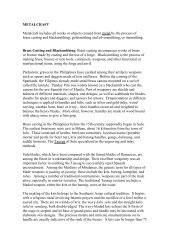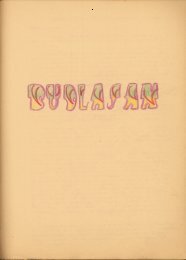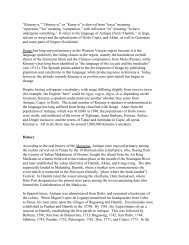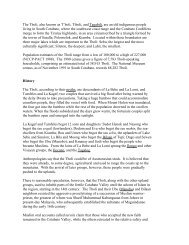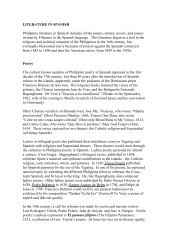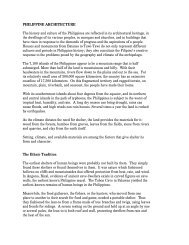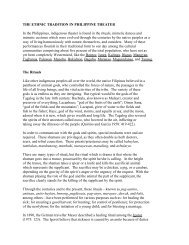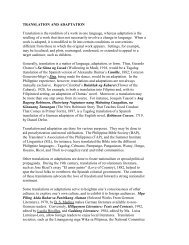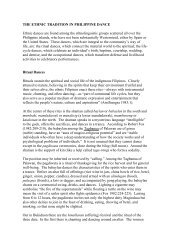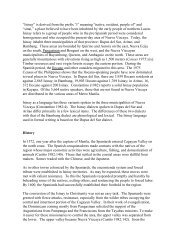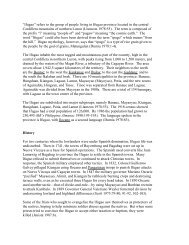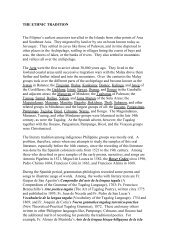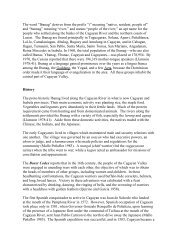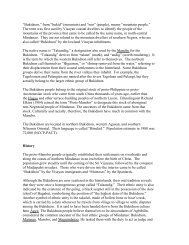LITERATURE IN ENGLISH Philippine literature in English is ...
LITERATURE IN ENGLISH Philippine literature in English is ...
LITERATURE IN ENGLISH Philippine literature in English is ...
You also want an ePaper? Increase the reach of your titles
YUMPU automatically turns print PDFs into web optimized ePapers that Google loves.
many of them still be<strong>in</strong>g read, studied and repr<strong>in</strong>ted: Bienvenido Santos’<br />
Villa Magdalena, 1965, The Volcano,1965, The Pray<strong>in</strong>g Man,1982;<br />
N.V.M. Gonzalez’s Season of Grace, 1956, and The Bamboo Dancers, 1959;<br />
Nick Joaqu<strong>in</strong>’s The Woman Who Had Two Navels,1961; F. Sionil Jose’s—<br />
The Pretenders, 1962, Mass, 1983, Tree, 1978, and Po-on,1984; Edith Tiempo’s<br />
H<strong>is</strong> Native Coast, 1975, and A Blade of Fern,1956; Edilberto Tiempo’s To Be Free,<br />
1972; Stevan Javellana’s Without See<strong>in</strong>g the Dawn, 1947; L<strong>in</strong>da Ty-Casper’s<br />
The Pen<strong>in</strong>sulars,1964, Await<strong>in</strong>g Trespass, 1985, W<strong>in</strong>gs of Stone, 1990; and others.<br />
To the roster have more recently been added Yuson’s Great <strong>Philipp<strong>in</strong>e</strong> Jungle<br />
Energy Café, 1987; Gamal<strong>in</strong>da’s Planet Waves, 1989, Confessions of a Volcano,<br />
1990, and The Empire of Memory,1992; Asundon Grajo Uranza’s Bamboo <strong>in</strong> the<br />
W<strong>in</strong>d, 1990; Edith Tiempo’s The Alien Corn,1992; L<strong>in</strong>a Esp<strong>in</strong>a-Moore’s The<br />
Honey, The Locusts,1992; Erw<strong>in</strong> Castillo’s The Firewalkers, 1992; N<strong>in</strong>otchka<br />
Rosca’s State of War, 1988, and Twice Blessed, 1992; Jessica Hagedorn’s<br />
Dog Eaters, 1990, and Jose Y. Dal<strong>is</strong>ay’s Kill<strong>in</strong>g Time <strong>in</strong> a Warm Place, 1992.<br />
The varied forms of these last additions have ranged from the traditional renditions<br />
of story, h<strong>is</strong>tory and memory, to genre-expand<strong>in</strong>g, convention-break<strong>in</strong>g tales, and<br />
show the livel<strong>in</strong>ess of the form, and the surety that no f<strong>in</strong>al statements can yet be<br />
made about the Filip<strong>in</strong>o novel <strong>in</strong> <strong>Engl<strong>is</strong>h</strong>.<br />
The essay <strong>is</strong> alive and lively <strong>in</strong> the newspapers and magaz<strong>in</strong>es, and <strong>in</strong> collections like<br />
Carmen Guerrero Nakpil’s The <strong>Philipp<strong>in</strong>e</strong>s, 1989, Yuson’s Confessions of a Q.C.<br />
House-Husband, 1991; Conrado de Quiros’ Flowers From the Rubble, 1990;<br />
Salanga’s A Personal Chronicle, 1991; and Nick Joaqu<strong>in</strong>’s Culture and H<strong>is</strong>tory,<br />
1988, and h<strong>is</strong> Quijano de Manila (h<strong>is</strong> journal<strong>is</strong>tic pseudonym) books like Reportage<br />
on Politics and Other Essays, Language of the Street and Other Essays, 1980.<br />
In recognition of th<strong>is</strong>, the Palanca Awards Committee has <strong>in</strong> the last decade<br />
awarded prizes for <strong>in</strong>formal and formal essays.<br />
Manila <strong>is</strong> not the center of writ<strong>in</strong>g <strong>in</strong> <strong>Engl<strong>is</strong>h</strong>, although it <strong>is</strong> the center of publication<br />
for it. Rosca, Hagedorn, Viray, Angeles, Lu<strong>is</strong> Francia, Marianne Villanueva (G<strong>in</strong>seng<br />
and Other Tales, 1991,) and Cabalqu<strong>in</strong>to write <strong>in</strong> the United States. Antonio Enriquez<br />
writes fiction <strong>in</strong> Cagayan de Oro; Tita Lacambra-Ayala writes her poems, and Jose<br />
Ayala h<strong>is</strong> stories <strong>in</strong> Davao (their son Joey Ayala wrote stories <strong>in</strong> <strong>Engl<strong>is</strong>h</strong>, but <strong>is</strong> better<br />
known for h<strong>is</strong> songs <strong>in</strong> Filip<strong>in</strong>o); Elsa Mart<strong>in</strong>ez Coscolluela, one of the few practic<strong>in</strong>g<br />
playwrights <strong>in</strong> <strong>Engl<strong>is</strong>h</strong>, writes <strong>in</strong> Bacolod; Ma. Lu<strong>is</strong>a Aguilar-Cariño writes and teaches<br />
<strong>in</strong> Baguio; the Tiempos are Dumaguete based, but may soon be writ<strong>in</strong>g from the United<br />
States, with daughter Rowena; L<strong>in</strong>a Esp<strong>in</strong>a Moore’s base <strong>is</strong> Cebu.<br />
What then are the fruits of eight decades of <strong>Philipp<strong>in</strong>e</strong> writ<strong>in</strong>g <strong>in</strong> <strong>Engl<strong>is</strong>h</strong>?<br />
Certa<strong>in</strong>ly a harvest of poems, short stories, essays and novels more bountiful than<br />
<strong>in</strong> any other country <strong>in</strong> which <strong>Engl<strong>is</strong>h</strong> <strong>is</strong> a second language, except perhaps India.<br />
Def<strong>in</strong>itely an elaboration of the forms of <strong>literature</strong>, for although the orig<strong>in</strong>al and<br />
cont<strong>in</strong>u<strong>in</strong>g models are largely from Anglo-American sources, these have been<br />
cross-poll<strong>in</strong>ated by Asian and native forms—the haiku, the tanaga, the pasyon,<br />
the awit and korido, the sarswela and komedya, the bugtong and balagtasan— <strong>in</strong>



